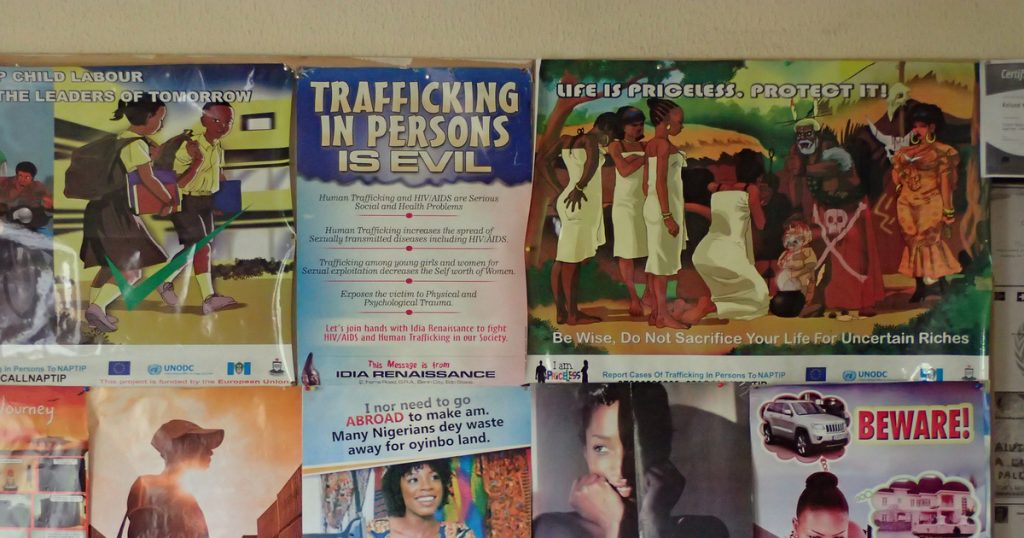Traditionally, when one imagines how someone ends up in slavery of any kind, one sees images of people being forcibly taken from their homes and sent to a foreign country, with absolutely no say in the matter. While this is usually the case in sexual slavery and for other kinds of bondage, it is no longer the case for women from Edo State in Nigeria, that provides 80% of women trafficked into Europe.1 Instead, there is a new phenomenon where women seek out passage to Europe through Madams, knowingly entering into prostitution. This was not always been the case, but extreme poverty, where some even lack running water, this practice has begun flourishing.2

Previously, recruiters lure women with tales of jobs in Europe, working for wealthy families, being hairdressers or nannies, only to find out the harsh reality of forced sex work once they arrived. Eventually, returning with embellished stories of wealth to tempt and recruit women themselves, completing the vicious cycle from victim to perpetrator. Some of the Madams even live in lavish houses, behind gates, as a testament of just what can be earned in European sex work. This show of wealth, in a desperate state, slowly began to transform just how women were recruited into the sex trafficking world.3
More recently, traffickers are being sought out by their victims in hope for a better life for themselves and their families.4 Little do they know of the harsh conditions and abuse they will endure before they can ever return home. After discussion of the “terms” of the work, the women sign legally binding contracts that say they will pay back rent, travel expenses, food, and other miscellaneous expenses, sometimes in a matter of months, sometimes in many years. These expenses total anywhere from 30,000 to 60,000 US dollars, on average. Usually, the women charge 5 to 10 US dollars per client, requiring them to work from sunup to sundown, and sometimes longer.5

Aside from relying on the signed contracts, Madams and pimps use the threat of violence against families, and religion, to keep the women from leaving.6 Using black magic referred to as JuJu, priests perform complex rituals that include eating raw chicken hearts, harm to oneself, drinking cocktails of their own fingernails, hair, and blood, as well as other methods, to bind the women with their traffickers. After completion of the rituals, they are made to feel that death, insanity, or harm will come to their families if they are to break their oath of repayment. A priest, who has benefited greatly from Madams and the pimps he has helped, stated in an interview that the purpose of these rituals are that “she never sleeps well or has peace of mind until she pays what she owes.”7

Furthermore, religion and belief in the negative effects that stem from the severance of the oaths have even led parents to become more complacent and insist that their daughters follow the requests of the people who are exploiting them.8 This, coupled with extreme poverty, exacerbate the growing phenomenon in Edo State, rendering it even more difficult to combat. Though, there are efforts to better the lives of women in Edo State. Education promotes agricultural development and other “basic needs industries,” and is central to the campaigns to inform about the horrors and negative effects of trafficking, and working toward the decriminalization, not legalization, of prostitution to help, instead of punish, those who have been ensnared in a vicious cycle of abuse which is making strides.9
New policies and rules are being implemented and promoted by grassroots organizations, and governments are taking notice. On November 15, 2000, the UN established a “Protocol to Prevent, Suppress and Punish Trafficking in Persons, Especially Women and Children, supplementing the United Nations Convention against Transnational Organized Crime,” which has 173 signatories, showing the world that these malum in se actions have become malum prohibitum or universally illegal, and punishable internaitonally.10 Even with all of these measures, and the recognition of this epidemic at an international level, there are still roughly 4.8 million people (19% of all humans trafficked) enslaved for sexual exploitation in the world, bringing in 99 billion dollars annually (66% of all profits from human trafficking).11 More must be done to end all forms of human trafficking, and it starts with a deeper understanding of the differing local and cultural patterns of recruitment throughout the world. Education and the provision of alternative work options remain the most powerful deterrents.
- Seema Kawar, From Benin City to the Shores of Italy: A New Hub of Human Trafficking, NAOC, (Accessed January 31, 2018), http://natoassociation.ca/from-benin-city-to-the-shores-of-italy-a-new-hub-of-human-trafficking/. ↵
- Abaobi Tricia Nwaubani, Cycle of exploitation turns Nigerian sex slaves in Italy into traffickers, News.trust.org, (Accessed February 12, 2018), http://news.trust.org/item/20161108000327-qfsaw/. ↵
- Abaobi Tricia Nwaubani, Cycle of exploitation turns Nigerian sex slaves in Italy into traffickers, News.trust.org, (Accessed February 12, 2018), http://news.trust.org/item/20161108000327-qfsaw/. ↵
- Abaobi Tricia Nwaubani, Cycle of exploitation turns Nigerian sex slaves in Italy into traffickers, News.trust.org, (Accessed February 12, 2018), http://news.trust.org/item/20161108000327-qfsaw/. ↵
- Esohe Aghatise, Iroko Onlus: Working to Combat the Trafficking of Nigerian Women and Girls Into Italy, Canadian Woman Studies 22, no. 3/4 (2003): 197-199, Humanities Full Text (H.W. Wilson), EBSCOhost (accessed January 31, 2018). ↵
- Esohe Aghatise, Iroko Onlus: Working to Combat the Trafficking of Nigerian Women and Girls Into Italy, Canadian Woman Studies 22, no. 3/4 (2003): 197-199, Humanities Full Text (H.W. Wilson), EBSCOhost (accessed January 31, 2018). ↵
- C. S. Baarda, Human trafficking for sexual exploitation from Nigeria into Western Europe: The role of voodoo rituals in the functioning of a criminal network, European Journal Of Criminology 13, no. 2 (2016): 257, Complementary Index, EBSCOhost (accessed January 31, 2018). ↵
- Abaobi Tricia Nwaubani, Cycle of exploitation turns Nigerian sex slaves in Italy into traffickers, News.trust.org, (Accessed February 12, 2018), http://news.trust.org/item/20161108000327-qfsaw/. ↵
- Esohe Aghatise, Iroko Onlus: Working to Combat the Trafficking of Nigerian Women and Girls Into Italy, Canadian Woman Studies 22, no. 3/4 (2003): 197-199, Humanities Full Text (H.W. Wilson), EBSCOhost (accessed January 31, 2018). ↵
- United Nations, Protocol to Prevent, Suppress and Punish Trafficking in Persons, Especially Women and Children, supplementing the United Nations Convention against Transnational Organized Crime, International Law & World Order: Westons & Carlsons Basic Documents, November 15, 2000, doi:10.1163/2211-4394_rwilwo_sim_033351. ↵
- Human Trafficking by the Numbers, Human Rights First, January 7, 2017. (Accessed February 12, 2018), https://www.humanrightsfirst.org/resource/human-trafficking-numbers. ↵



90 comments
Lashanna Hill
Lack of education, poverty, and basic human rights will only continue this practice in areas such as Nigeria. That’s disheartening to understand that these women and girls end up signing legally bounding contracts that trap them into exploitative sex work. I do believe that in order to tackle this all parties involved have to be very honest and not just on the poverty side of things. It’s a business that is definitely a boosting part of developing countries’ GDP and would need to have some sort of accountability for overlooking the exploitation of women and girls around the world. For the young girls and women whose families are becoming complacent with this route out of poverty-stricken situations, it would be interesting to see which programs and opportunities stem from the prevention campaign. Excellent article.
Nursultan Berdaliyev
Of course, sexual slavery is disgusting and sometimes unimaginable how it can happen these days, but I understand that this is happening primarily because of the severe poverty that many people in Africa are experiencing. It was new to me that pimps even use magical rituals to recruit and put psychological pressure on these people. Nevertheless, I believe that to solve this problem, first of all, the government needs to work on the education system, followed by financial assistance to those in need, and ensuring proper work. Of course, this will not stop those who decided to make money this way, but it should minimize the number of victims of sexual slavery. Good job!
James Fee
80% of women trafficked in Europe from one state in Nigeria is a staggering figure, and I had no idea this issue was so geographically concentrated. The coordinated use of indigenous religion (via the priests) and debt (via the pimps) is so effective at enslaving women who wanted a chance at a better life. I would hope, given how concentrated the issue seems to be, that local and international officials can disrupt some of these trafficking rings and educate local women on the dangers of these arrangements.
Pedro Lugo Borges
Slavery is awful in no matter what way it is, but sexual exploitation is just despicable and before this article I was not aware of the religious and blackmail incentive that the slavers use to the exploited to keep them as slaves and then as advertisement back at home for the practice. While i didn’t fully understand the numbers at the end of the paragraph as is it saying that these women traffic represent 19 percent of all humans trafic in the world or that 19 percent of humans are traffic this way. The second figure even more alarming if its only 19 percent of all the people traffic makes almost 3/4 of all profits in this illegal trade there’s gonna be a lot of incentive to keep it going so i’m scared this problem won’t be solved soon and many people will have to live in this kind of mal-fortune.
Alondra Lozano
Sex trafficking has always been a world problem and it will most likely always be, due to people who live in poverty. It is such a horrible thing, especially when they hesitate to stop it due to the “black magic” that will harm their families if they don’t do what they are told. It is a violation of human rights and in my opinion I feel like not a lot of people put much importance to this subject.
Sara Guerrero
The extreme poverty going on around the world is one of the many large issues going on in the world, the fact that people are being trafficked for business is disgusting and it just shows how large of an issue this is. Goverments need to step it up and starts implementing plans and goals for the benefit of the people and stop issues like these. It’s sad that in order to fix large issues like these all you need is a better education system and only then can the world really start changing for the better.
Jose Chaman
This topic is really alarming. The situation that these women go through is really horrible and inhuman, the state of Nigeria should implement economic policies that favor their economic growth and work, so there will be more jobs and law control, and women will not have to go through this martyrdom. Living in a society with stable human rights, these situations should not occur, international intervention should be immediate, and unfortunately there is no talk about these issues.
Christopher Metta Bexar
I agree with the other commentators. Sex trafficking is a human rights violation, and needs to be stopped. But the extreme poverty that has existed in Africa since the colonial times makes it still a way of escape for families who are willing to sell their children and wives into this form of slavery.
Am not sure exactly what it will take to slow down the tide of slavery but education and making it unattractive to the madams and pimps would be a start in the right direction.
Samire Adam
I never knew about the instances of sex trafficking that were taking place in Edo State. This article was well written about a subject that I had no idea what was going on. It’s sickening as well because the article mentions that the women often times volunteer themselves to be trafficked. I think sex trafficking like in the one I have read here have to be made into a bigger issue because sex trafficking is a violation of human rights.
Clarissa Gonzalez
Sex trafficking has and always will be a world problem that just won’t go away. It has such a long and horrible history that will hopefully go away as time passes. The way people get women and children to go with the flow of sexual trafficking is just horrid and they deserve more than what they get in these situations. I’m so glad this article touches upon such an important topic that needs so much more recognition.